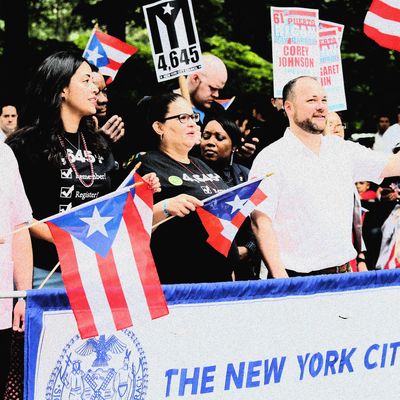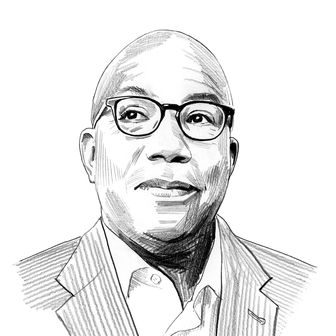
It’s a great mystery — and to some, a source of anger — that New York has never elected a Latino candidate to citywide or statewide office. In the next few weeks, we’ll discover whether New York’s Democratic leaders will help address the problem by coalescing around one of three Latino candidates for the potent position of City Council Speaker.
It’s been done before: Puerto Rican–born Melissa Mark-Viverito was elevated to Speaker in 2014 with help from newly elected Mayor Bill de Blasio. While it’s only the 51 members of the council who select the speaker, a wide range of special interests will help shape the choice. Party insiders are being explicitly asked to do something similar to make up for the lack of Latino representation at the highest levels of government.
On one level, special political assistance should not be necessary: There’s no shortage of raw political talent in New York’s Latino community. Representative Alexandria Ocasio-Cortez is one of the best-known members of Congress in America and the youngest woman ever elected to the body. She serves alongside other pioneers: Nydia Velasquez, the first Puerto Rican woman ever elected to Congress; Adriana Espaillat, the first member of Congress to have once been an undocumented immigrant; and Ritchie Torres, who last year became the first openly gay Latino congressman.
That’s not all. In recent years, Mark-Viverito painstakingly helped mastermind the unprecedented election of 31 women to the council, making women legislators a majority for the first time. Antonio Reynoso was just elected as Brooklyn’s first Latino borough president, and Eric Gonzalez easily won re-election as Brooklyn district attorney.
Even with all this ability, no experienced Latino officeholder tried to swing for the fences by running citywide for mayor, comptroller, or public advocate. Ruben Diaz Jr., the Bronx borough president, would have been a front-runner but decided not to enter the contest — and announced he is leaving electoral politics altogether.
The community’s only mayoral candidate in this cycle, Afro-Latina Dianne Morales, had never run before, and in the end got less than 3 percent of the vote in the Democratic primary, finishing sixth in the early rounds of ranked-choice voting.
“It’s a problem because we are not putting things on the agenda that should be put,” says Eli Valentin, an adjunct professor at Union Theological Seminary who is a shrewd observer of Latino politics. “Political participation, which means potentially political power, proper political representation — that stuff is missing.”
The city’s fast-growing Latino population currently makes up 28.3 percent of the overall population and is soon expected to surpass the proportion of white New Yorkers (who are currently 30.9 percent of the city but growing at a much slower rate). If the city’s roughly 2.5 million Latino residents were a single borough, it would be New York’s largest — and the fourth-biggest city in America.
This exploding population has high levels of need. More than half live in poverty, according to city numbers, compared with a third of non-Latinos. Sixty percent of Dominicans and Mexicans — more than one million New Yorkers — live below 200 percent of the federal poverty level, which translates into an annual income of less than $48,500 a year for a family of four.
Latinos make up a disproportionate share of low-wage essential workers, like the deliveristas who bring New Yorkers our food and the carwasheros who scrub vehicles for tips. They have higher-than-average rates of chronic diseases like diabetes. And recent climate catastrophes Superstorm Sandy and Hurricane Ida struck especially hard in Latino communities like Sunset Park, Red Hook, and the Lower East Side.
The combination of high needs and low representation were the subject of the recent Somos el Futuro political conference in Puerto Rico, attended by everyone from Governor Hochul and Mayor-elect Eric Adams to newly elected City Council members, along with an army of donors, party leaders, lobbyists and strategists.
“Hunger, health care, education, housing — those have been the topics of discussion,” Councilwoman Carlina Rivera told me in an interview from San Juan. “There is a brand new class of City Council members that are incoming. So we want to make sure they understand the issues that are affecting the Latino population and, of course, make sure we have equity in representation.”
The City Council speakership — a powerful post with citywide influence — has emerged as a central concern of Latino politicians. Rivera is considered a leading contender for the job, as are councilman Franciso Moya of Queens and Diana Ayala, whose district includes East Harlem and part of the South Bronx.
Each of the three has unique strengths. Rivera, backed by Representative Velasquez, is a progressive who has spent time building relationships with newly-elected left-leaning council members, including at a reception she sponsored for them in Puerto Rico. Moya, who served in the state assembly, is considered close to Adams. And Ayala, a former aide to Mark-Vivierito, is supported by Representative Adriano Espaillat and has a compelling personal story.
“I bring 11 years of legislative experience, both at the state and city level, that can really help drive our economy back and really work with my colleagues to really get our folks back to work,” Moya told me. “I represent the district that was the epicenter of COVID throughout the last 18 months. We’ve seen the clear disparities in our communities, and we need to have someone who can really fight to build a robust budget that is reflective of all New Yorkers, so that we don’t have to go through the same thing that we went through in the last 18 months.”
Ayala’s tough upbringing gives her a special insight into how city agencies work — or don’t — for poor New Yorkers.
“I share the same story as many New Yorkers, unfortunately. I’ve been food insecure, I’ve been homeless twice. I was a teenage parent; my son’s father was shot and killed when I was three months pregnant, the night before my 16th birthday. I dropped out of school, I’ve lost other family members to gun violence,” she told me. “You can check it off — pretty much every social-justice issue that we fight for has been mine. I understand the nuances and government, how social-service programs operate, where they are effective and where we have loopholes. And I think that allows me a distinct voice in this race.”
Three talented contenders who have paid their political dues and represent communities in need. Is there room for one of them at the table of power in progressive New York?






























